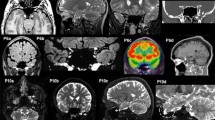Abstract
Several neuropsychological studies have shown that brain-damaged patients may demonstrate category-specific deficits for grammatical classes of words, such as nouns and verbs. We describe 3 patients with selective impairments of these latter categories. The first patient, with marked atrophy of the left temporal lobe, was disproportionately impaired in naming and comprehension of nouns. The second patient, with a predominantly left frontal lobe atrophy, was selectively impaired in naming and comprehension of verbs. The third patient, with a left frontal lobe perfusion abnormality, had a selective impairment in naming and comprehension of verbs. Evidence from the present study support the hypothesis that anatomically distinct neural systems in the temporal and frontal lobes of the dominant hemisphere might play a critical role in lexical processing of nouns and verbs respectively.
Sommario
Numerosi studi neuropsicologici hanno dimostrato che è possibile osservare in soggetti cerebrolesi la comparsa di deficit categoriali che riguardano parole appartenenti a specifiche classi grammaticali, quali i nomi ed i verbi. In questo studio descriviamo tre pazienti con tali deficit categoriali. Il primo paziente, con un quadro di marcata atrofia del lobo temporale sinistro, ha ottenuto prestazioni marcatamente deficitarie in prove di denominazione e comprensione di nomi. La seconda paziente, con un quadro di atrofia frontale prevalente a livello dell'emisfero sinistro, ha ottenuto prestazioni deficitarie in prove di denominazione e comprensione di verbi. Il terzo paziente, con un quadro di ridotta perfusione a livello del lobo frontale sinistro, ha ottenuto prestazioni deficitarie in prove di denominazione e comprensione di verbi. Il presente studio suggerisce l'ipotesi che sistemi neurali anatomicamente distinti a livello dei lobi temporale e frontale dell'emisfero dominante possano svolgere un ruolo critico, rispettivamente, nel processing lessicale dei nomi e dei verbi.
Similar content being viewed by others
References
Albert M.L., Feldman R.G., Willis A.L.:The “subcortical dementia” of progressive supranuclear palsy. J. Neurol. Neurosurg. Psychiat. 37:121–130, 1974.
Basso A., Capitani E., Laiacona M.:Progressive language impairment without dementia: a case with isolated category specific semantic defect. J. Neurol. Neurosurg. Psychiatry 51:1201–1207, 1988.
Baxter D.M., Warrington E.K.:Category specific phonological dysgraphia. Neuropsychologia 23:653–666, 1985.
Caramazza A., Hillis A.E.:Lexical organization of nouns and verbs in the brain. Nature 349:788–790, 1991.
D'Antona R., Baron J.C., Samson Y., Serdaru M. et al.:Subcortical dementia: frontal cortex hypometabolism detected by positron tomography in patients with progressive supranuclear palsy Brain 108:785–799, 1985.
Gainotti G.:The categorical organization of semantic and lexical knowledge in the brain. Behav. Neurol. 3:109–115, 1990.
Goffinet A.M., De Volder A.G., Gillain C., et al.:Positron tomography demonstrates frontal lobe hypometabolism in progressive supranuclear palsy. Ann. Neurol. 25:131–139, 1989.
Golbe L.I., Davis P.H., Schoenberg B.S., Duvoisin R.C.:Prevalence and natural history of progressive supranuclear palsy. Neurology 38:1031–1034, 1988.
Goodglass H., Klein B., Carey P., Jones K.:Specific semantic word categories in aphasia. Cortex 2:74–89, 1966.
Goodglass H., Budin C.:Category and modality specific dissociations in word comprehension and concurrent phonological dyslexia. Neuropsychologia 26:67–78, 1988.
Grafman J., Litvan I., Gomez C., Chase T.N.:Frontal lobe function in progressive supranuclear palsy. Arch. Neurol. 47:553–558, 1990.
Grant D.A., Berg E.A.:A behavioural, analysis of degree of reinforcement and ease of shifting to new responses in a Weigl-type card-sorting problem. J. Exp. Psycol. 38:404–411, 1948.
Hart J., Berndt R.S., Caramazza A.:Category-specific naming deficit following cerebral infarction. Nature 316:439–440, 1985.
Hillis A.E., Caramazza A.:Category-specific naming and comprehension impairment: a double dissociation. Brain 114:2081–2094, 1991.
Leenders K.L., Frackowiak R.S.J., Lees A.J.:Steele-Richardson-Olszewski syndrome: brain energy metabolism, blood flow and fluorodopa uptake measured by positron emission tomography. Brain 111:615–630, 1988.
Maher E.R., Smith E.M., Lees A.J.:Cognitive deficits in the Steele-Richardson-Olszewski syndrome (progressive supranuclear palsy). J. Neurol. Neurosurg. Psychiatry 48:1234–1239 1985.
McCarthy R.A., Warrington E.K.:Category specificity in an agrammatic patient: the relative impairment in verb retrieval and comprehension. Neuropsychologia 23:709–727, 1985.
McCarthy R.A., Warrington E.K.:Evidence for modality-specific meaning systems in the brain. Nature 334:428–430, 1988.
McKenna P., Warrington E.K.:Testing for nominal dysphasia. J. Neurol. Neurosurg. Psychiatry 43:781–788, 1980.
Mesulam M.M.:Slowly progressive aphasia without generalized dementia. Ann. Neurol. 11:592–598, 1982.
Miceli G., Silveri M.C., Villa G., Caramazza A.:On the basis for the agrammatic's difficulty in producing main verbs. Cortex 20:207–220, 1984.
Miceli G., Silveri M.C., Nocentini U., Caramazza A.:Patterns of dissociation in comprehension and production of nouns and verbs. Aphasiology 2:351–358, 1988.
Miceli G., Laudanna A., Burani C.:Batteria per l'analisi dei deficit afasici, Associazione per le ricerche neuropsicologiche, Milano, 1991.
Pillon B., Dubois B., Lhermitte F., Agid Y.:Heterogeneity of cognitive impairment in progressive supranuclear palsy, Parkinson's disease, and Alzheimer's disease. Neurology 36:1179–1185, 1986.
Raven J.C.:Progressive Matrices (1947), Lewis, London, 1949.
Sartori G., Job R.:The oyster with four legs: a neuropsychological study on the interaction of visual and semantic information. Cognitive Neuropsych. 5:105–132, 1988.
Semenza C., Zettin M.:Evidence from aphasia for the role of proper names as pure referring expressions. Nature 342:678–679, 1989.
Silveri M.C., Gainotti G.:Interaction between vision and language in category-specific semantic impairment. Cognitive Neuropsych. 5:677–709, 1988.
Silveri M.C., Daniele A., Giustolisi L., Gainotti G.:Dissociation between knowledge of living and nonliving things in dementia of the Alzheimer type, Neurology 41:545–546, 1991.
Warrington E.K.:The selective impairment of semantic memory. Q.J. Exp. Psych. 27:635–657, 1975.
Warrington E.K., McCarthy R.A.:Category specific access dysphasia. Brain 106:859–878, 1983.
Warrington E.K., Shallice T.:Category specific semantic impairments. Brain 107:829–854, 1984.
Warrington E.K., McCarthy R.A.:Categories of knowledge: further fractionations and an attempted integration. Brain 110:1273–1296, 1987.
Weintraub S., Rubin N.P., Mesulam M.M.:Primary progressive aphasia: longitudinal course, neuropsychological profile, and language features. Arch. Neurol. 47:1329–1335, 1990.
Yamadori A., Albert M.L.:Word, category aphasia. Cortex 9:112–125, 1973.
Zingeser L.B., Berndt R.S.:Grammatical class and context effects in a case of pure anomia: implications for models of language production. Cognitive Neuropsychol. 5:473–516, 1988.
Zingeser L.B., Berndt R.S.:Retrieval of nouns and verbs in agrammatism and anomia. Brain Lang. 39:14–32, 1990.
Author information
Authors and Affiliations
Rights and permissions
About this article
Cite this article
Daniele, A., Silveri, M.C., Giustolisi, L. et al. Category-specific deficits for grammatical classes of words: Evidence for possible anatomical correlates. Ital J Neuro Sci 14, 87–94 (1993). https://doi.org/10.1007/BF02339048
Issue Date:
DOI: https://doi.org/10.1007/BF02339048




